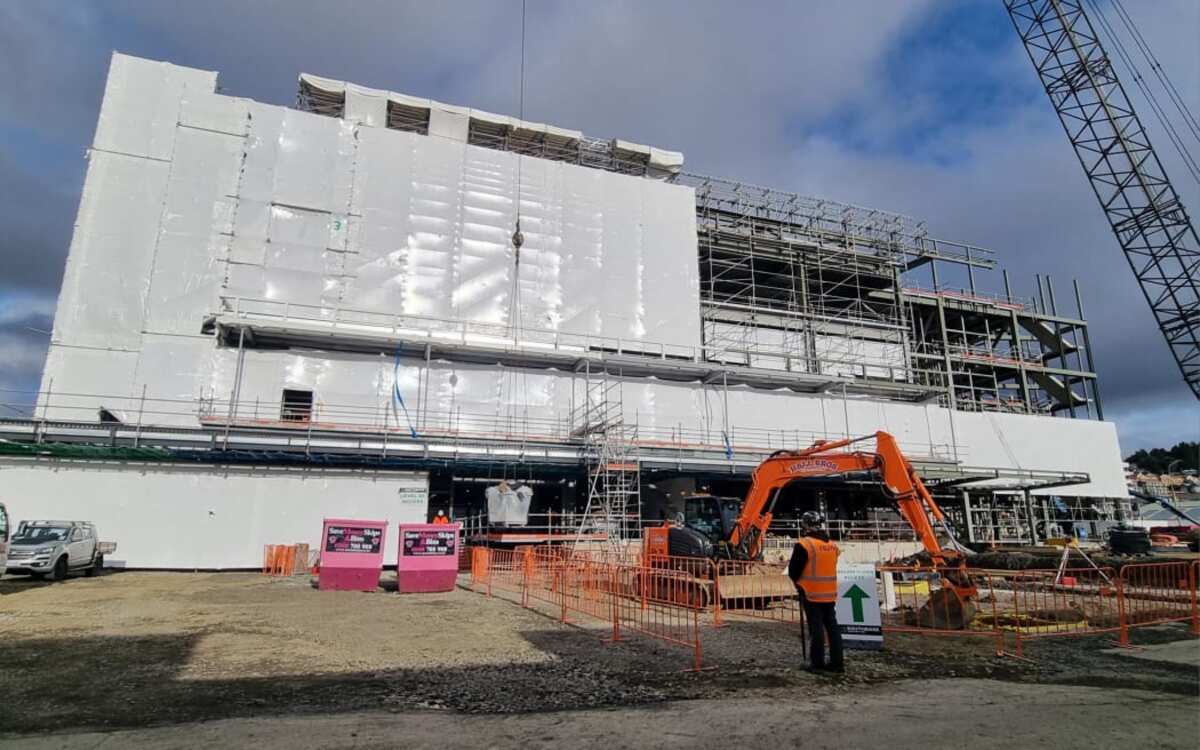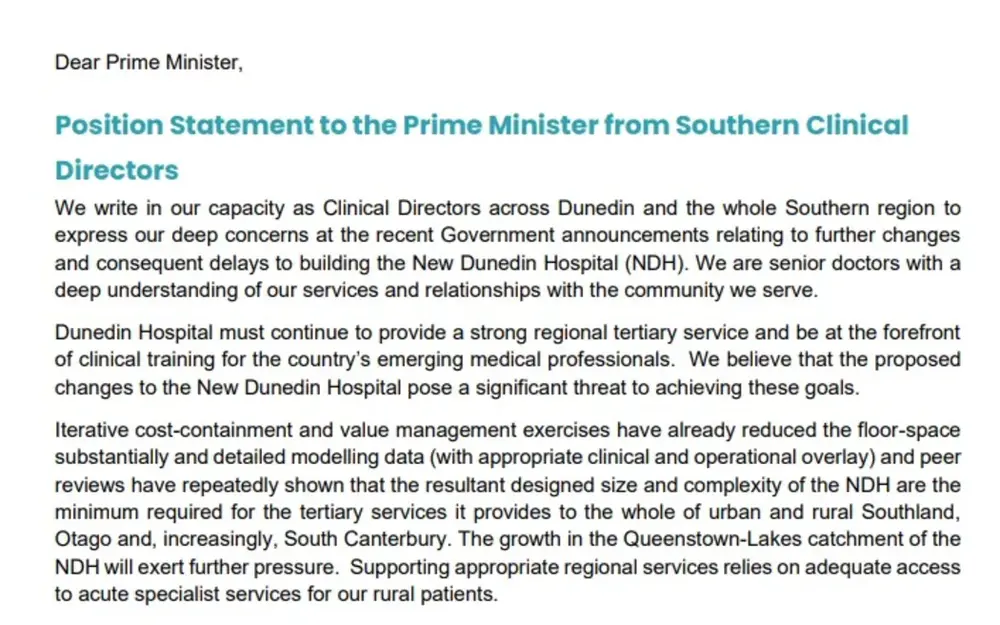Senior southern region doctors send PM warning letter over stalled Dunedin Hospital rebuild
Reporting by RNZ
16 October 2024, 11:30 PM
 The government is considering changes to the Dunedin Hospital rebuild, after costs escalated to over $1.8 billion. Photo: RNZ/Tess Brunton
The government is considering changes to the Dunedin Hospital rebuild, after costs escalated to over $1.8 billion. Photo: RNZ/Tess BruntonMore than 40 clinical directors across the southern region have written to the government warning it of the risks in changing the Dunedin Hospital rebuild.
The very senior doctors have each signed a letter to Christopher Luxon, and his ministers of health, finance and infrastructure, warning services could be left in a "precarious" state.
The ministers are considering changing what is built, and when, after costs escalated to over $1.8 billion.
But the letter says the current design for the New Dunedin Hospital (NDH) was the culmination of numerous clinicians giving extensive input.

44 clinical directors across the southern region have written to the government warning it of the risks in changing the Dunedin Hospital rebuild. Photo: Supplied
"Each square metre ... has been carefully considered, including embedding expectations of higher efficiency, standardisation of spaces, and future flexibility, all while keeping patient safety front of mind," they wrote on Tuesday.
"We are concerned that the proposals to achieve cost savings at this late and time-pressured stage risk leaving the NDH in a clinically and operationally precarious state, and we will fail to realise those savings."
Their letter called for "extreme caution" and for any changes to satisfy the same clinical standard.
Clinical directors from Dunedin, Balclutha, Gore, Dunstan, Southland, Oamaru and the Queenstown areas all signed the letter, to Luxon, Shane Reti, Nicola Willis and Chris Bishop.
Last year, National promised to fully fund the hospital build, and earlier this year it said it aimed to reinstate parts of the project cut under Labour to save money.
The Ministers now say new costings show several hundred million dollars would be added on top of the budget that they put an extra $290m into in May, to get to $1.88 billion.
One option they are now looking at is refurbishment of the old ward block, but the doctors' letter warned: "Recent experiences with even modest refurbishments resulted in a cascade of knock-on adverse clinical ramifications and patient risk across multiple floors of the hospital."
Tens of thousands of people marched in protest in Dunedin late last month.
The clinical directors in the new letter said they had "a deep understanding of our services and relationships with the community we serve", and people needed a strong regional tertiary (advanced) service that also provided clinical training. Dunedin recently lost its ability to train oncologists due to staff shortages.
"We believe that the proposed changes to the New Dunedin Hospital pose a significant threat to achieving these goals," they said.
Redesigns had already cut back on its size, to a bare minimum, not factoring in extra pressure from the growing Queenstown-Lakes area, according to peer reviews, the letter said. A major review two years ago had led to an "unacceptably small" design for pathology services "and now a disproportional cost required to mitigate this decision".
They remained open to cost management and "thoughtful" changes "providing that these demonstrate equal clinical integrity, equal focus on patient safety, embrace flexibility and standardisation, include appropriate redundancy, minimise impact to the programme, and provide meaningful capital and operational cost savings".
"We call on the government to satisfy itself that all these conditions have been met before accepting any proposals for change to the NDH design."
In response to the letter, Reti said ministers met twice with clinical and health team leads when they visited Dunedin last month to announce their response to a cost blowout.
"We recognise and value the commitment and dedication of clinicians around this project," he said.
"Their insight and inputs will continue to be valued as the process moves forward."
Ministers had no choice, he said, because if Dunedin continued to go "so far over budget, it puts hospital builds in Nelson, Whangārei, Hawke's Bay, Palmerston North and Tauranga at risk".
The government had put an extra $290m into the build already, "but as you're aware, an independent review has shown that the project has now become so troubled that this still isn't enough".
That May review was followed by other cost assessments, which RNZ has sought copies of.
"I want to assure the people of Dunedin and the south, clinicians and health workers, that Health New Zealand and ministers are fully committed to making sure we deliver long overdue solutions to their region's health infrastructure," Reti said.
'We're going to listen' - Reti
Asked at Parliament if he is concerned at the warning about a "precarious" state, Reti said, "Look, that would be a concern but that's what we're working through, obviously with the options that are in front of us, the two options, so we'll take that into account.
"Course we're going to listen to what they said to us."
The two options are:
- Changing the project's specs and scope, such as reducing the number of floors, delaying the fit-out of some areas or keeping services on the existing hospital site
- Building a new clinical services building and refurbishing the existing ward tower on the old hospital site
Reti said the doctors could follow up their concerns through a clinical transformation group attached to the project, whose chair Dr Sheila Barnett, signed the letter.
Infrastructure Minister Chris Bishop had yet to read the letter sent on Tuesday but said it was being considered.
"The officials from Health New Zealand will be working through that as part of the advice they are giving to Cabinet around reducing the cost of the new Dunedin hospital project. We've asked for urgent advice."
Bishop said the government stood by its decision a month ago that the new Dunedin Hospital as it was, was undeliverable within an affordability threshold the government was comfortable with.
Mayor supportive of clinicians' stance
Dunedin's mayor Jules Radich was not surprised by the letter and supported the clinicians' call.
"They've been involved in this painstaking exercise over many years to get that hospital figured out and the right size," Radich said.
"For goodness sake, Prime Minister, listen to what the experts are saying to you. They are imploring you to build this hospital the right size."
He believed Dr Reti was driven to build the hospital to the right size, but said, "the forces of finance are pressing on him".
Radich urged the government not to make a short-term capital expense saving that would cost far more in operational expenses for years to come.
"It's a false economy. The clinicians know that and I believe the Minister of Health knows that."
The government needed to build the hospital once and build it right for the job it was designed for, he said.
Published with permission
NEWS
SOUTHLAND'S LOCAL LEGENDS





